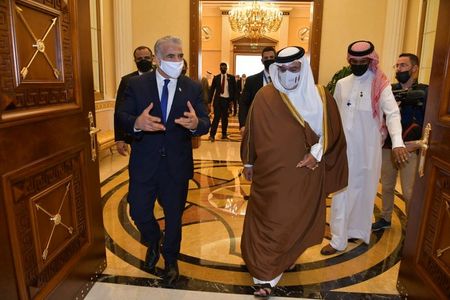DUBAI (Reuters) -Bahrain hosted the Israeli foreign minister on Thursday in the highest-level visit since the countries established ties last year, as the kingdom’s Gulf Air launched direct flights to Tel Aviv.
Arriving in Manama on a plane with an olive branch painted on its nose, Foreign Minister Yair Lapid met King Hamad bin Isa Al Khalifa and Crown Prince and Prime Minister Salman bin Hamad Al Khalifa, and then signed five bilateral cooperation deals.
“His Majesty’s leadership and inspiration have led to true cooperation and our meeting outlined the path forward for our relationship,” Lapid said on Twitter after the palace audience.
Bahrain and Gulf neighbour United Arab Emirates normalised relations with Israel last year in a U.S.-brokered deal known as the Abraham Accords that built on common commercial interests and worries about Iran. Sudan and Morocco followed suit.
“Our opportunities are shared. Our threats are also shared, and they aren’t far from here,” Lapid said in remarks to reporters, according to a transcript issued by his office.
It said that Lapid and his Bahrain counterpart signed deals on cooperation in medicine, healthcare, sports, and on water and environmental conservation. Lapid was also due to inaugurate Israel’s embassy in Manama.
Separately, the first Gulf Air commercial flight touched down in Tel Aviv, launching a twice-weekly direct connection.
The normalisation accords had been denounced by the Palestinians as abandoning a unified position under which Arab states would make peace only if Israel gave up occupied land.
In Gaza, the Islamist Hamas group criticised Bahrain for hosting Lapid, who returns to Israel on Thursday evening. Hamas spokesman Hazem Qassem said this represented “an encouragement” of what he described as Israeli “crimes against our Palestinian people and their sacred sites”.
The accords have also been criticised by Bahraini opposition figures, speaking largely from abroad, as well as locals who stand against normalisation.
The island state, which quashed an uprising led mostly by Shi’ite Muslim members of its population in 2011, saw some sporadic acts of protest after the pact was signed.
On Thursday Bahraini activists circulated on social media images of what appeared to be small protests in Bahrain, including some tire burnings. Reuters was unable to independently verify these.
The Sunni-ruled kingdom, host to the U.S. Navy’s Fifth Fleet, accuses Iran of stoking unrest in Bahrain, a charge that Tehran denies.
(Reporting by Jeffrey Heller, Nidal Al Mughrabi and Lisa Barrington; Editing by Giles Elgood, Emelia Sithole-Matarise, William Maclean)





